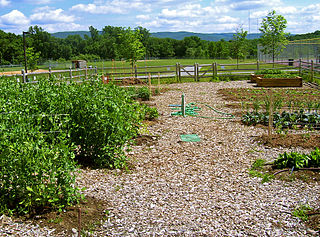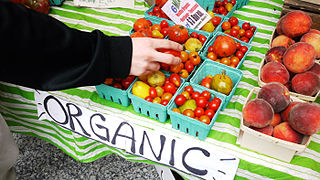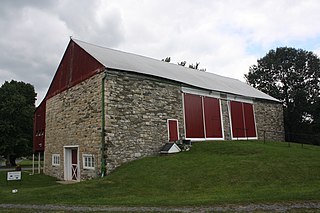Related Research Articles

Organic farming is an agricultural system that uses fertilizers of organic origin such as compost manure, green manure, and bone meal and places emphasis on techniques such as crop rotation and companion planting. It originated early in the 20th century in reaction to rapidly changing farming practices. Certified organic agriculture accounts for 70 million hectares globally, with over half of that total in Australia. Organic farming continues to be developed by various organizations today. Biological pest control, mixed cropping and the fostering of insect predators are encouraged. Organic standards are designed to allow the use of naturally-occurring substances while prohibiting or strictly limiting synthetic substances. For instance, naturally-occurring pesticides such as pyrethrin and rotenone are permitted, while synthetic fertilizers and pesticides are generally prohibited. Synthetic substances that are allowed include, for example, copper sulfate, elemental sulfur and Ivermectin. Genetically modified organisms, nanomaterials, human sewage sludge, plant growth regulators, hormones, and antibiotic use in livestock husbandry are prohibited. Organic farming advocates claim advantages in sustainability, openness, self-sufficiency, autonomy and independence, health, food security, and food safety.

Masanobu Fukuoka was a Japanese farmer and philosopher celebrated for his natural farming and re-vegetation of desertified lands. He was a proponent of no-till, herbicide and pesticide free cultivation methods from which he created a particular method of agriculture, commonly referred to as "natural farming" or "do-nothing farming".

The following outline is provided as an overview of and topical guide to organic gardening and farming:

Subsistence agriculture occurs when farmers grow food crops to meet the needs of themselves and their families on smallholdings. Subsistence agriculturalists target farm output for survival and for mostly local requirements, with little or no surplus. Planting decisions occur principally with an eye toward what the family will need during the coming year, and only secondarily toward market prices. Tony Waters, a professor of sociology, defines "subsistence peasants" as "people who grow what they eat, build their own houses, and live without regularly making purchases in the marketplace."

The organic movement broadly refers to the organizations and individuals involved worldwide in the promotion of organic food and other organic products. It started during the first half of the 20th century, when modern large-scale agricultural practices began to appear.
The Soil Association is a charity based in the United Kingdom. Founded in 1946, its activities include campaign work on issues including opposition to intensive farming, support for local purchasing and public education on nutrition; as well the certification of organic food.

Lady Evelyn Barbara Balfour, was a British farmer, educator, organic farming pioneer, and a founding figure in the organic movement. She was one of the first women to study agriculture at an English university, graduating from the institution now known as the University of Reading.

Sir Albert Howard was an English botanist. His academic background might have been botany. While working in India he was generally considered a Pathologist; this more than likely being the reason for his consistent observations of the value of compost applications being an increase in health(of the whole system). The first westerner to document and publish the Indian techniques of sustainable agriculture. After spending considerable time learning from Indian peasants and the pests present in their soil, he called these two his professors. He was a principal figure in the early organic movement. He is considered by many in the English-speaking world to have been, along with Rudolf Steiner and Eve Balfour, one of the key advocates of ancient Indian techniques of organic agriculture.

Jerome Irving Rodale was a publisher, editor, author, playwright, and founder of Rodale, Inc. He was an early advocate of sustainable agriculture and organic farming in the United States. As an author, his work included several magazines and books, including books featuring different authors, on the subject of health. He popularized the term "organic" as a term for growing food without pesticides. Rodale also published works on other topics, including The Synonym Finder.

Traditional farming was the original type of agriculture, and has been practiced for thousands of years. All traditional farming is now considered to be "organic farming" although at the time there were no known inorganic methods. For example, forest gardening, a fully organic food production system which dates from prehistoric times, is thought to be the world's oldest and most resilient agroecosystem. After the industrial revolution had introduced inorganic methods, most of which were not well developed and had serious side effects. An organic movement began in the 1940s as a reaction to agriculture's growing reliance on synthetic fertilizers and pesticides. The history of this modern revival of organic farming dates back to the first half of the 20th century at a time when there was a growing reliance on these new synthetic, non-organic methods.
Walter Ernest Christopher James, 4th Baron Northbourne, was an English agriculturalist, author and rower who competed in the 1920 Summer Olympics.

Rodale Institute is an American 501(c)(3) nonprofit that supports research into organic farming. The Institute was founded in 1947 by entrepreneur J.I. Rodale in Emmaus, Pennsylvania. When J.I. Rodale died in 1971, his son Robert purchased 333 acres and moved the farm to its current site in Kutztown, Pennsylvania.
Robert David "Bob" Rodale was an American adherent of organic farming, regenerative agriculture, and gardening and a publisher focused on health and wellness lifestyle magazines and books. Rodale was the founder of the Lehigh Valley Velodrome.
The Australian Organic Farming and Gardening Society (1944–1955) was founded in Sydney on 5 October 1944, during the closing months of World War II. It came into being two years before the United Kingdom's Soil Association, thus becoming the first agriculture organisation in the world to call itself an "organic" association.

The Rodale Organic Gardening Experimental Farm, also known as the Working Tree Center, is a historic home and farm located in Lynn Township, Lehigh County, Pennsylvania. It is important in the history of organic gardening and farming in the 20th century.
Louise Ernestine Howard was a classics scholar, international civil servant and supporter of organic farming.
Gabrielle Louise Caroline Howard, usually cited as G. L. C. Matthaei, was an English plant physiologist and economic botanist who advocated organic farming.

Regenerative agriculture is a conservation and rehabilitation approach to food and farming systems. It focuses on topsoil regeneration, increasing biodiversity, improving the water cycle, enhancing ecosystem services, supporting biosequestration, increasing resilience to climate change, and strengthening the health and vitality of farm soil.

Frank Newman Turner, NDA, NDD, FNIMH, was a British pioneering organic farmer, writer and broadcaster, who, based on his experience of natural treatment of animals, later became a consulting medical herbalist and naturopath. His books Fertility Farming, Fertility Pastures, and Herdsmanship are regarded as classics of practical organic husbandry.
Guy Theodore Wrench was a British agronomist, nutritionist, and physician. He was a pioneer of the organic movement.
References
- ↑ Howard, Sir Albert (1943), An Agricultural Testament (PDF), Oxford, UK: Oxford University Press, archived from the original (PDF) on 2 July 2010, retrieved 9 August 2010 pdf per Special Rodale Press Edition, 1976. See cover note on significance of book.
- ↑ William Lockeretz, ed. (2007), Organic Farming: An International History, Oxfordshire, UK & Cambridge, Massachusetts: CAB International (CABI), ISBN 978-0-85199-833-6 , retrieved 10 August 2010 ebook ISBN 978-1-84593-289-3
- 1 2 Michael Pollan (2006), The Omnivore's Dilemma , The Penguin Press, p. 145, ISBN 978-1-59420-082-3